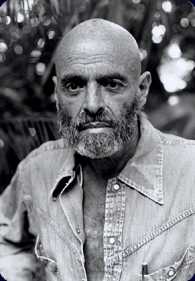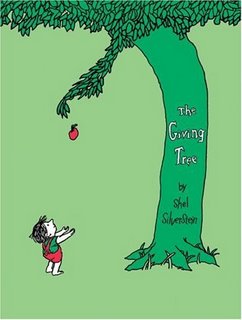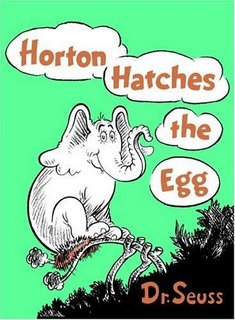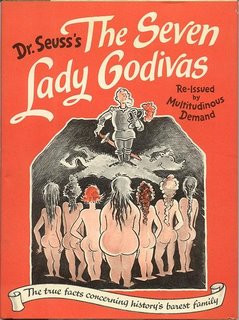Shel Silverstein (1930-1999)
Shel Silverstein was an American poet, songwriter, musician, composer, cartoonist, screenwriter and author of children's books. Silverstein claimed he never studied the poetry of others, and therefore developed his own style. His style was laid-back and conversational, occasionally employing profanity and slang. My favourite is "The Giving Tree". The story is a short moral tale about a relationship between a young boy and a tree in the forest. It tells the account of how the tree helps the boy with his needs throughout his life. As the title suggests, the book is a tale of true unconditional love. Another enchanting collection is "Where the Sidewalk Ends", a collection of illustrations and poems which themes include many common childhood worries and problems, as well as fanciful stories. Some take the form of miniature fairy tales or stories which end abruptly for humorous effect.
THE GIVING TREE
Once there was a giving tree who loved a little boy.
And everyday the boy would come to play
Swinging from the branches, sleeping in the shade
Laughing all the summer’s hours away.
And so they love,
Oh, the tree was happy.
Oh, the tree was glad.
But soon the boy grew older and one day he came and said,
"Can you give me some money, tree, to buy something I’ve found?"
"I have no money," said the tree, "Just apples, twigs and leaves."
"But you can take my apples, boy, and sell them in the town."
And so he did and
Oh, the tree was happy.
Oh, the tree was glad.
But soon again the boy came back and he said to the tree,
"I’m now a man and I must have a house that’s all my home."
"I can’t give you a house" he said, "The forest is my house."
"But you may cut my branches off and build yourself a home"
And so he did.
Oh, the tree was happy.
Oh, the tree was glad.
And time went by and the boy came back with sadness in his eyes.
"My life has turned so cold," he says, "and I need sunny days."
"I’ve nothing but my trunk," he says, "But you can cut it down
And build yourself a boat and sail away."
And so he did and
Oh, the tree was happy.
Oh, the tree was glad.
And after years the boy came back, both of them were old.
"I really cannot help you if you ask for another gift."
"I’m nothing but an old stump now. I’m sorry but I’ve nothing more to give"
"I do not need very much now, just a quiet place to rest,"
The boy, he whispered, with a weary smile.
"Well", said the tree, "An old stump is still good for that."
"Come, boy", he said, "Sit down, sit down and rest a while."
And so he did and
Oh, the trees was happy.
Oh, the tree was glad.
Theodor Seuss Geisel aka Dr Seuss (1904-1991)
Like many other children, Dr. Seuss was a part of my early life with such books as Green Eggs and Ham, The Cat in the Hat, And to Think That! Saw It All on Mulberry Street, Horton Hatches an Egg, stories of the Sneetches, and the east-going Grinch's memorable confrontation with the west-going Grinch. They were fun books to read, certainly more fun and interesting than the books used at school. His books are of an amazing concoction of political commentary, advertising wit, off-the-wall essays on life and living, with an assortment of fantastic creatures and humans. The style of drawings were familiar, the turn of phrase and incredible names, but the topics and subjects were very different.
In an interview around his seventy-fifth birthday, Dr Seuss told the writer for the Los Angeles Times Book Review:
"I tend to basically exaggerate in life, and in writing, it's fine to exaggerate. I really enjoy overstating for the purpose of getting a laugh. It's very flattering, that laugh, and at the same time it gives pleasure to the audience and accomplishes more than writing very serious things. For another thing, writing is easier than digging ditches. Well, actually that's an exaggeration. It isn't."
Horton Hatches the Egg
This book concerns Horton (an elephant) convinced by an irresponsible bird named Mayzie into sitting on her egg while she takes a break--which proves to last for months. Of course, the absurd sight of an elephant sitting atop a tree makes quite a scene.
Horton is laughed at by his jungle friends, captured by hunters, forced to endure a terrible sea voyage, and finally placed in a travelling circus. All through the ordeal Horton repeats this refrain:
I meant what I said, and I said what I meant:
An elephant's faithful one hundred percent.
Mayzie finds Horton at the circus just in time to see her egg hatch. She demands the egg back, but is denied it by Horton and the rest when it hatches into a tiny winged elephant.The moral of the story is probably "be responsible, even when it's difficult." Horton's demonstrated responsibility in keeping his promise to Mayzie by staying with the egg, even when it's hard to do so. He's also faithful, not only to his external obligations, but to his inner self as well.
Lastly, a sudden urge to post a shout out to anyone who has a copy of Dr Seuss's "The Seven Lady Godivas: The True Facts Concerning History's Barest Family" The book was written for adults and is a retelling of the tale of Lady Godiva. It's currently out of print and is a very rare item. I'd whore myself to anyone who is willing to get me a copy. period.
For those who has the faintest idea who Lady Godiva is, she, Godiva (c. 980-1067) was an Anglo-Saxon lady, who, according to legend, rode naked through the streets of Conventry in England, in order to gain a remission of the oppressive toll imposed by her husband on his tenants. Interestingly, a term for Lady Godiva Syndrome is "Exhibitionism". Even an asteroid's named after her.













No comments:
Post a Comment